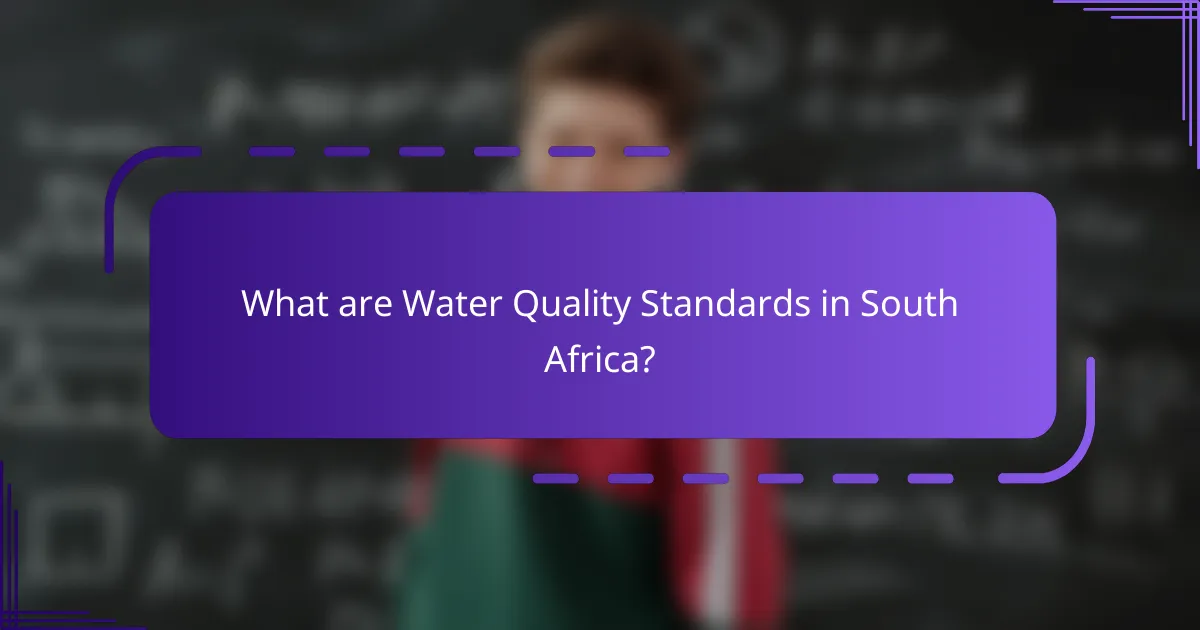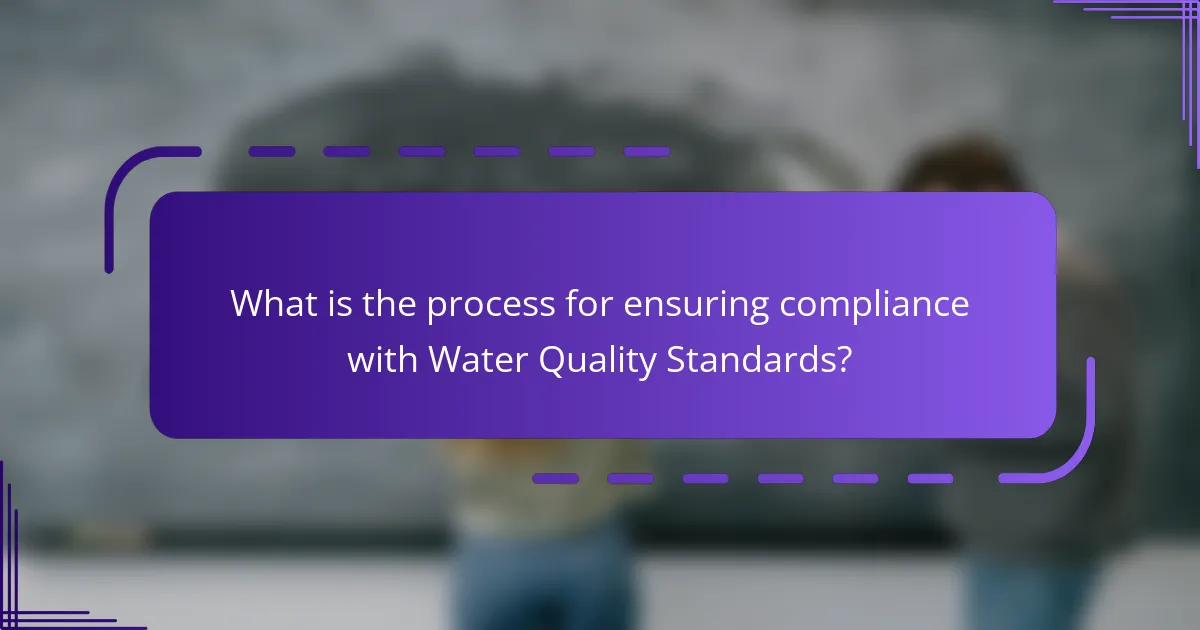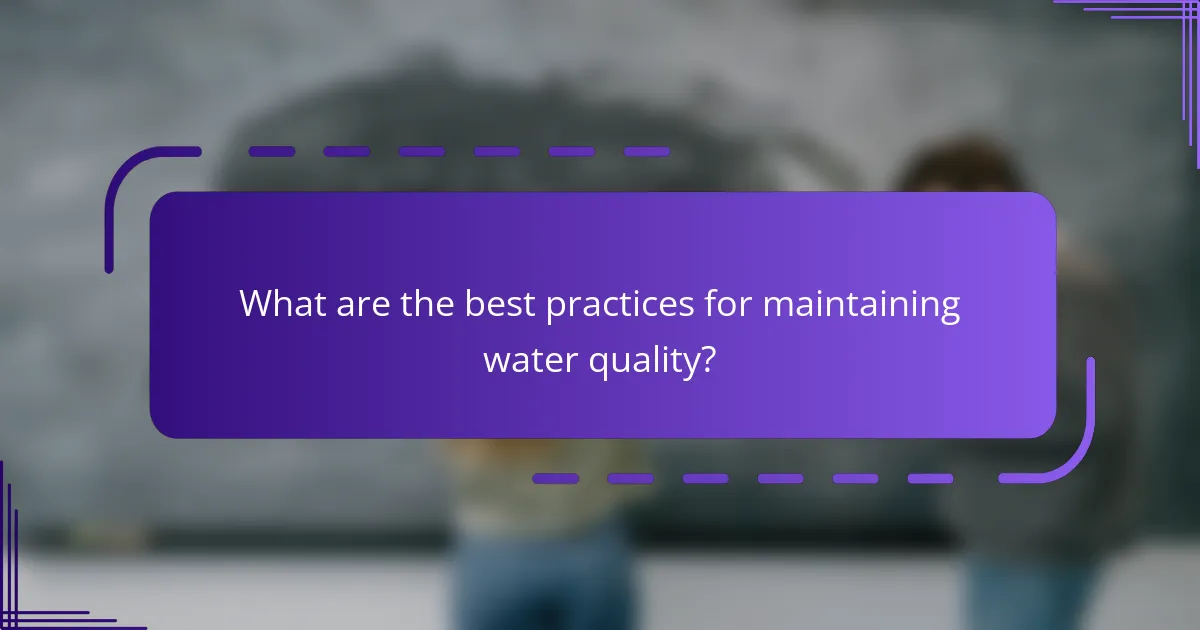Water Quality Standards in South Africa are regulatory benchmarks established by the South African National Water Act of 1998, aimed at safeguarding human health and the environment. These standards encompass various chemical, physical, and biological parameters, with specific limits set for pollutants such as heavy metals and pathogens. The Department of Water and Sanitation is responsible for monitoring compliance through systematic sampling and testing, ensuring that water quality meets established standards. Regular testing, treatment processes, and community education are crucial for maintaining safe drinking water and protecting aquatic ecosystems. This article provides an overview of the importance of these standards and outlines the compliance guidelines necessary for effective water quality management in South Africa.

What are Water Quality Standards in South Africa?
Water Quality Standards in South Africa are regulatory benchmarks that define acceptable water quality levels. These standards ensure the protection of human health and the environment. The South African National Water Act of 1998 establishes these standards. They cover various aspects, including chemical, physical, and biological parameters. The Department of Water and Sanitation oversees compliance with these standards. Specific limits are set for pollutants like heavy metals and pathogens. Monitoring programs are implemented to assess water quality regularly. Compliance ensures safe drinking water and protects aquatic ecosystems.
Why are Water Quality Standards important for public health?
Water Quality Standards are crucial for public health because they ensure safe drinking water and protect ecosystems. These standards set limits on harmful contaminants, such as bacteria, heavy metals, and chemicals. By regulating these substances, they prevent waterborne diseases that can cause serious health issues. For instance, the World Health Organization estimates that contaminated water leads to approximately 485,000 diarrheal deaths each year. Furthermore, maintaining high water quality standards supports overall community well-being and economic stability. Clean water is essential for hygiene, food safety, and sanitation. Therefore, effective water quality standards are vital for safeguarding public health.
What are the key parameters measured in water quality?
Key parameters measured in water quality include pH, dissolved oxygen, turbidity, and nutrient levels. pH indicates the acidity or alkalinity of water. Dissolved oxygen is crucial for aquatic life. Turbidity measures water clarity, affecting light [censured]. Nutrient levels, such as nitrogen and phosphorus, influence algae growth. These parameters are essential for assessing water health. Monitoring them ensures compliance with water quality standards.
How do these parameters affect human health and the environment?
Water quality parameters significantly affect human health and the environment. Poor water quality can lead to waterborne diseases such as cholera and dysentery, impacting public health. High levels of contaminants can cause long-term health issues, including cancer and neurological disorders.
In South Africa, inadequate water quality standards contribute to these health risks. For instance, the presence of heavy metals like lead and mercury can result in serious health complications.
Environmental impacts include the degradation of aquatic ecosystems. Contaminated water sources harm fish populations and disrupt food chains. Additionally, nutrient pollution can lead to algal blooms, which deplete oxygen levels in water bodies.
Overall, maintaining strict water quality standards is essential for safeguarding both human health and environmental integrity.
What organizations are responsible for setting these standards?
The organizations responsible for setting water quality standards in South Africa include the Department of Water and Sanitation (DWS) and the South African Bureau of Standards (SABS). The DWS formulates policies and regulations related to water quality management. It oversees the implementation of the National Water Act and the Water Services Act. The SABS develops national standards for various sectors, including water quality. It ensures compliance with these standards through certification and testing. Together, these organizations play a crucial role in maintaining and regulating water quality in South Africa.
How do these organizations collaborate to ensure compliance?
Organizations collaborate to ensure compliance by establishing regulatory frameworks and partnerships. They share data and best practices to monitor water quality. Joint initiatives often include workshops and training programs. These programs aim to educate stakeholders about compliance requirements. Regular meetings facilitate communication between organizations. Collaborative research projects enhance understanding of water quality issues. They also develop standardized compliance assessment tools. This structured approach helps maintain and improve water quality standards.
What role does the government play in enforcing these standards?
The government plays a crucial role in enforcing water quality standards in South Africa. It establishes regulations through the National Water Act and the Water Services Act. These laws set the framework for monitoring and maintaining water quality. The government conducts regular assessments of water resources and facilities. It also collaborates with local authorities to ensure compliance. Enforcement actions may include fines or legal proceedings against violators. The Department of Water and Sanitation oversees these efforts. This structured approach helps protect public health and the environment.

What is the process for ensuring compliance with Water Quality Standards?
The process for ensuring compliance with Water Quality Standards involves several key steps. First, water quality is monitored through regular sampling and testing. This testing measures parameters such as pH, turbidity, and contaminant levels. Second, data from these tests is compared against established Water Quality Standards. These standards are defined by regulatory bodies to protect public health and the environment. Third, if non-compliance is detected, corrective actions are implemented. This may include treatment processes to improve water quality. Fourth, continuous monitoring ensures that compliance is maintained over time. Lastly, reports are submitted to relevant authorities to document compliance status. This systematic approach helps safeguard water resources in South Africa.
How are water quality assessments conducted in South Africa?
Water quality assessments in South Africa are conducted through a systematic process involving sample collection, laboratory analysis, and data interpretation. The Department of Water and Sanitation oversees these assessments to ensure compliance with national standards. Samples are collected from various water sources, including rivers, lakes, and groundwater. These samples are then analyzed for physical, chemical, and biological parameters. Common parameters include pH, turbidity, nutrients, and microbial contaminants. The results are compared against the South African Water Quality Guidelines. This ensures that water quality meets safety and health standards for human consumption and ecological sustainability. Regular assessments help in monitoring changes in water quality over time and inform water management strategies.
What methods are used for testing water quality?
Common methods for testing water quality include physical, chemical, and biological assessments. Physical assessments measure turbidity, color, and temperature. Chemical assessments analyze pH, dissolved oxygen, and contaminants like heavy metals. Biological assessments evaluate the presence of microorganisms and aquatic life. Laboratory tests often utilize spectrophotometry for chemical analysis. Field tests may include portable kits for immediate results. Each method provides vital data on water safety and compliance with standards. Regular testing is essential for maintaining water quality in South Africa.
How frequently are water quality assessments performed?
Water quality assessments are typically performed on a regular basis, often monthly or quarterly. The frequency can depend on the specific regulations set by governing bodies. In South Africa, the National Water Act requires assessments to ensure compliance with water quality standards. These assessments help monitor the safety and suitability of water for various uses. Regular assessments are crucial for identifying pollution sources and protecting public health.
What are the consequences of non-compliance with water quality standards?
Non-compliance with water quality standards can lead to severe consequences. These include health risks to the population, as contaminated water can cause diseases. Economic impacts arise from increased healthcare costs and loss of productivity. Environmental degradation occurs, affecting aquatic ecosystems and biodiversity. Legal repercussions may involve fines and penalties for violating regulations. Communities may face reduced access to clean water, impacting quality of life. According to the World Health Organization, unsafe water can lead to over 500,000 deaths annually from waterborne diseases. Compliance is essential to ensure public health and environmental protection.
What penalties do organizations face for failing to meet standards?
Organizations in South Africa face various penalties for failing to meet water quality standards. These penalties can include fines, which may range from thousands to millions of rand depending on the severity of the violation. In some cases, organizations may also face legal action, resulting in court-imposed sanctions. Additionally, non-compliance can lead to the suspension or revocation of licenses necessary for operation. Regulatory bodies, such as the Department of Water and Sanitation, enforce these penalties to ensure adherence to standards. Historical data shows that enforcement actions have increased in recent years, reflecting a stricter regulatory environment.
How does non-compliance affect communities and ecosystems?
Non-compliance with water quality standards negatively impacts communities and ecosystems. It leads to the deterioration of water resources. Contaminated water sources can cause health problems for local populations. Communities may experience increased rates of waterborne diseases. Ecosystems suffer from reduced biodiversity and habitat degradation. Polluted water can harm aquatic life and disrupt food chains. Non-compliance can also result in economic losses for communities reliant on fishing and tourism. Studies indicate that poor water quality contributes to significant public health costs.

What are the best practices for maintaining water quality?
Regularly testing water quality is essential for maintaining it. Testing should include checking for contaminants, pH levels, and turbidity. Implementing filtration systems helps remove impurities. Using chlorination or UV treatment can disinfect water effectively. Ensuring proper storage in clean containers prevents recontamination. Regular maintenance of water sources is crucial to prevent pollution. Educating the community about pollution sources enhances overall water quality. Following local regulations and guidelines ensures compliance with water quality standards.
How can individuals contribute to water quality preservation?
Individuals can contribute to water quality preservation by adopting sustainable practices. They can reduce water pollution by properly disposing of hazardous waste. This includes not pouring chemicals down the drain. Individuals can also participate in local clean-up efforts for rivers and lakes. Using environmentally friendly products helps minimize chemical runoff. Conserving water reduces the strain on water treatment facilities. Planting native vegetation can prevent soil erosion and filter pollutants. Educating others about water conservation raises awareness and promotes collective action. According to the South African Department of Water and Sanitation, community involvement is crucial for maintaining water quality standards.
What actions can households take to improve water quality?
Households can improve water quality by implementing several key actions. First, they should regularly test their water for contaminants. Testing kits are widely available and provide essential data on water quality. Second, households can install water filtration systems. These systems can effectively remove impurities and harmful substances. Third, maintaining plumbing systems is crucial. Leaky pipes can introduce contaminants and affect water quality.
Additionally, households should avoid using harmful chemicals for cleaning and gardening. Eco-friendly alternatives can help reduce chemical runoff into water sources. Proper disposal of pharmaceuticals and hazardous waste is also important. Flushing these items can contaminate water supplies. Finally, households can conserve water to reduce strain on local water resources.
According to the South African National Water Act, maintaining water quality is essential for public health and environmental sustainability. Implementing these actions can lead to significant improvements in local water quality.
How can communities work together to monitor and maintain water quality?
Communities can work together to monitor and maintain water quality through collaborative initiatives. They can establish local water quality monitoring groups. These groups can conduct regular water testing for contaminants. Community members can be trained in water sampling techniques. They can also use standardized testing kits to ensure consistency. Local governments can support these efforts by providing resources. Educational workshops can raise awareness about water quality issues. Engaging with local schools can foster a culture of stewardship. Together, these actions can lead to improved water quality and community health.
What resources are available for understanding and improving water quality?
Resources available for understanding and improving water quality include government agencies, non-profit organizations, and educational institutions. In South Africa, the Department of Water and Sanitation provides guidelines and standards for water quality management. The Water Research Commission conducts research and disseminates findings on water quality issues. Various NGOs, like the South African Water Caucus, advocate for sustainable water practices. Universities offer courses and research opportunities focused on water quality. Online platforms, such as the World Health Organization, provide global water quality resources. Local community programs often engage citizens in monitoring and improving water quality.
Where can one find guidelines and resources on water quality management?
Guidelines and resources on water quality management can be found through government agencies and environmental organizations. The South African Department of Water and Sanitation provides comprehensive resources on water quality standards. Their website includes guidelines for monitoring and managing water quality. Additionally, the World Health Organization offers international guidelines relevant to water quality management. Academic institutions also publish research and guidelines on this topic. The South African Water Research Commission conducts studies and provides resources on water quality management practices.
What educational programs are available for water quality awareness?
Educational programs for water quality awareness include community workshops, school curricula, and online courses. These programs aim to educate individuals about the importance of water quality and its impact on health and the environment. For instance, the South African Department of Water and Sanitation offers training sessions for local communities. Additionally, various NGOs provide educational resources and programs tailored for different age groups. Schools often incorporate water quality topics into science classes, enhancing student awareness. Online platforms also offer courses focused on water management and conservation. These initiatives collectively contribute to improved public understanding of water quality issues.
Water Quality Standards in South Africa are regulatory benchmarks established under the National Water Act of 1998, aimed at ensuring safe drinking water and protecting the environment. This article outlines the importance of these standards for public health, detailing key parameters measured, such as pH and turbidity, and the organizations responsible for their enforcement, including the Department of Water and Sanitation. It also discusses the compliance process, the consequences of non-compliance, and best practices for maintaining water quality. Additionally, the article highlights community involvement and available resources for understanding and improving water quality management.